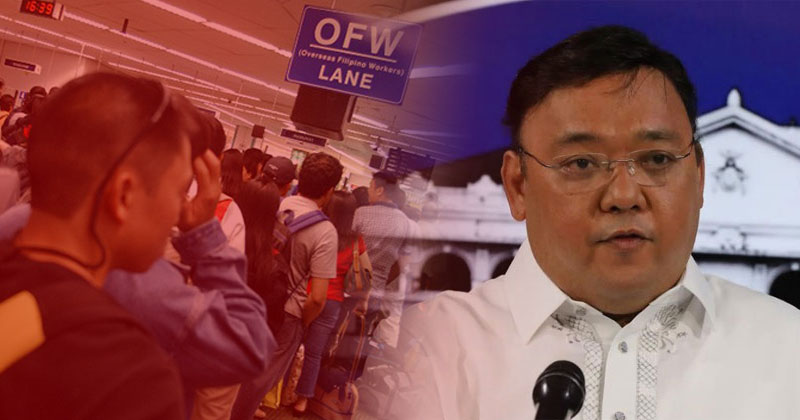Overseas Filipino workers (OFWs), except health care workers covered by the deployment ban, are now allowed to work abroad, Malacañang announced on Thursday.
Presidential Spokesperson Harry Roque said this was among the approved guidelines under the Inter-Agency Task Force for the Management of Emerging Infectious Diseases’ (IATF-EID) Resolution 36.
“Land-based or sea-based OFWs are allowed to be deployed abroad upon the execution of a declaration signifying their knowledge and understanding of the risks involved,” Roque said in a virtual presser.
Medical professionals are still banned from leaving the country under the deployment ban issued by the Philippine Overseas Employment Administration (POEA), he added.
Roque said the IATF-EID also allowed recruitment and placement agencies to operate in areas under modified enhanced community quarantine (MECQ) and general community quarantine (GCQ).
Government offices and agencies involved in the processing of OFW deployment are directed to establish “green lanes” to enable prompt processing and deployment, he added.
The POEA earlier issued Resolution 09, temporarily suspending the deployment of all health care workers “until the national state of emergency is lifted.”
However, criticism from labor groups prompted the IATF-EID to review the temporary deployment ban and eventually allow health care workers with perfected and signed overseas employment contracts as of March 8 to work abroad.
Last May 4, President Rodrigo Duterte said he would discuss with Justice Secretary Menardo Guevarra the legality of stopping health workers from leaving the country since he was concerned about their health and safety.
Roque explained that it is perfectly legal for Duterte to exercise police powers to stop Filipino health workers from migrating since the primary basis for the President’s concern is their health and safety.
Justice Undersecretary Markk Perete said they would consider the health care workers’ right to travel and seek livelihood outside the country, as well as the health situation in the country.
Out of the 11,618 confirmed cases of Covid-19 in the Philippines, health authorities said more than 2,000 health care workers have tested positive for the disease while 35 have died as of May 12.
AKAP program
Meanwhile, Roque allayed concerns after the Department of Labor and Employment (DOLE) announced that it has stopped accepting additional applications for the Abot Kamay ang Pagtulong (AKAP) cash-aid program for displaced and returning OFWs.
“Antayin po natin na ma-replenish yung pondo ng DOLE para diyan. Titingnan nga po natin sa reportng DBM kung yung mga pondo na pupuwede ma-realign, a portion of that will be allotted to this program (Let us wait for the DOLE funds to be replenished. We will check the report of the Department of Budget and Management if a portion of funds that can be realigned can be allotted to this program),” he said.
Roque also encouraged OFWs to consider applying for cash aid under the Department of Finance’s (DOF) Small Business Wage Subsidy (SBWS) for small and medium enterprises (MSMEs).
“Meron po tayong pansalo na programa. Ito po yung subsidy program ng Department of Finance para sa small and medium enterprises. Kung hindi po kayo nag-qualify sa programa ng DOLE, puwede pa po kayo mag-apply sa programa ng DOF (We have another program. It’s the subsidy program of the Department of Finance for small and medium enterprises. If you did not qualify under the DOLE program, you can apply under the DOF program),” he said.
Labor Secretary Silvestre Bello III earlier bared that the DOLE had to put the program on hold after exceeding its allocation meant for 150,000 OFWs.
The DOLE was given a PHP1.5 billion fund to provide a one-time cash aid of PHP10,000 each for 150,000 OFWs.
On the other hand, the DOF’s SBWS provides a wage subsidy ranging from PHP5,000 to PHP8,000 (based on the regional minimum wage) per month per eligible employee.
The DOF was allotted PHP51 billion for MSME workers. (By Azer Parrocha, PNA)



